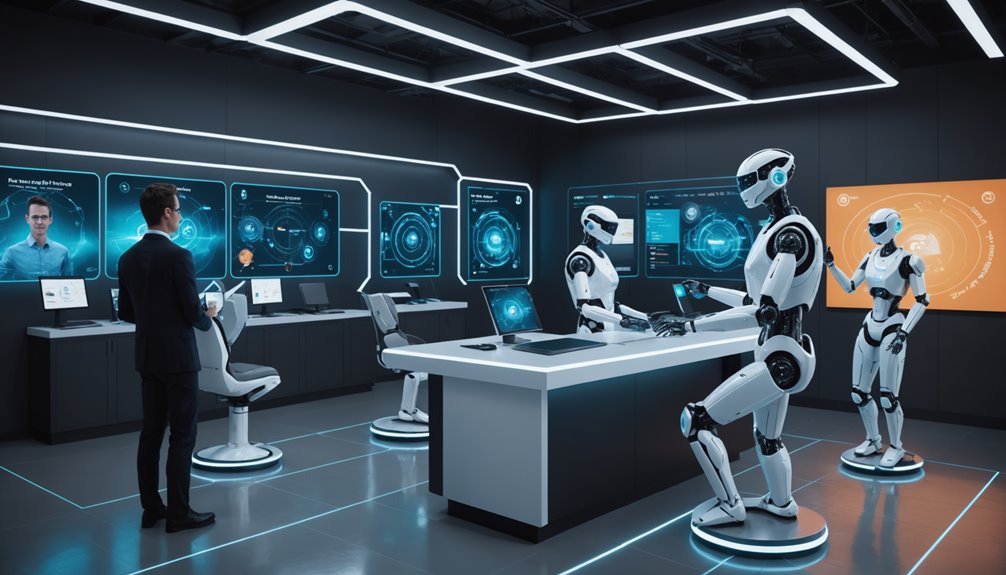By 2025, AI chatbots will redefine how businesses approach customer service and sales. These tools provide round-the-clock support, ensuring customers receive help whenever needed. This transformation in customer service also frees up staff to focus on more complex issues, improving efficiency and lowering costs. Businesses that adopt these solutions see immediate benefits, including a 25% boost in customer satisfaction.
AI-powered chatbots don’t just assist; they actively improve the customer journey. With data-driven insights and advanced machine learning, these bots can handle inquiries with emotional intelligence, fostering stronger relationships. They also streamline sales by acting as virtual assistants, guiding customers through purchasing decisions, and significantly increasing sales conversion rates. This seamless support transforms customer service and strengthens sales strategies.
Integrating cutting-edge technologies like natural language processing has pushed the boundaries of what’s possible. These tools enable businesses to leap ahead of their competition by creating smoother, more intelligent, and more personalized experiences. Transforming customer service isn’t just a trend; it’s a necessity for businesses looking to stay relevant in a competitive market. Exploring these innovations is the key to unlocking their full potential.
Key Takeaways
- AI chatbots are projected to automate up to 80% of customer inquiries by 2025, significantly lowering operational costs and boosting efficiency.
- Personalized services, immediate assistance, and integration across various platforms will enhance customer engagement and experience.
- Future AI chatbots will use deep learning techniques to optimize their responses and integrate with IoT devices to resolve issues autonomously.
- By 2025, emotionally intelligent chatbots will leverage machine learning to improve understanding of emotional cues, leading to more empathetic and accurate responses.
- AI chatbots will transform into powerful sales assistants, driving sales conversion rates up and streamlining sales processes through automation and data-driven insights.
AI Chatbot Efficiency 2025
AI chatbots are projected to transform customer service and sales in 2025 and offer unmatched efficiency. With an anticipated cost reduction of up to 30%, businesses will witness a significant decline in customer support costs. The efficiency is also reflected in the average savings of $0.70 per interaction and 4 minutes per request, which will total $11 billion in savings by 2022.
These chatbots also promise improved response times. With an impressive satisfaction rate of 87.58% among users interacting solely with chatbots, it’s evident that AI-powered conversational solutions are adept at resolving complaints swiftly. Additionally, the ability to operate 24/7 considerably reduces customer wait times.
In terms of customization, AI chatbots of 2025 will utilize Natural Language Processing (NLP) and Natural Language Understanding (NLU) to comprehend context and deliver tailored responses. Features like sentiment analysis will enable chatbots to adapt to customer emotions and offer a customized messaging experience. Moreover, these AI chatbots are likely to serve as efficient sales automation tools, predicting customer behavior and handling repetitive tasks, thereby streamlining sales operations.
The future also foresees energy-efficient AI chatbots. With reduced carbon footprints through optimized algorithms and green data centers, the AI chatbots of 2025 will not only transform customer service and sales but also contribute to sustainable development.
Moreover, the AI chatbots of 2025 are expected to offer dynamic recommendations based on user habits, further enhancing the shopping experience for customers (dynamic recommendations).
Enhanced Customer Engagement
The roleof AI chatbots in customer service is rapidly evolving. They go beyond mere efficiency to significantly improve customer engagement. AI chatbots, integrating advanced Natural Language Processing (NLP) and extensive customer data, deliver tailored experiences that boost customer satisfaction. This customization extends from understanding and analyzing customer inquiries to generating dynamic content based on interactions.
The introduction of immediate assistance and 24/7 availability guides customers through individualized paths, fostering seamless interactions. AI chatbots are not confined to a single platform; their integration across e-commerce and social media platforms provides cohesive experiences, ensuring freedom in customer interaction. Automating routine inquiries and scheduling tasks significantly improves response times and lead conversion rates.
AI chatbots are also developing affective intelligence. Through sentiment analysis and AI-driven empathy, they comprehend customer emotional states, delivering lifelike interactions that improve satisfaction and loyalty. Predictive analytics enables proactive customer service, adapting to customer feelings and needs.
Further, these chatbots are instrumental in data collection and analysis. By identifying trends and patterns in customer inquiries and preferences, they offer valuable insights that inform business strategies. This data-driven approach boosts customer profiling, leading to improved customer engagement and satisfaction.
In fact, businesses that leverage AI for customer experience are predicted to see a 40% increase in revenue due to personalized experiences (40% revenue increase). This potential for significant financial growth is driving the rapid adoption of AI chatbots in customer service.
Future AI Chatbot Capabilities

As we cast an eye towards the future of AI chatbots in customer service and sales, two significant advancements are anticipated – emotionally aware chatbots and profound learning improvements. Emotionally aware chatbots, with their ability to comprehend and respond to user sentiment, offer a more relatable and individualized customer interaction. Concurrently, the use of deep learning techniques will enable AI chatbots to process and interpret vast amounts of data, optimizing their responses and enhancing the comprehensive quality of customer support.
Additionally, the advent of AI Agents will drive a transition from simple chatbots to sophisticated, context-aware assistants, offering a new level of personalized interactions with business systems (integration with business systems). These advancements are also likely to decrease customer service costs significantly, as AI-powered chatbots can reduce these costs by up to 30% (AI cost savings).
Emotionally Intelligent Chatbots
With the advent of sentimentally intelligent chatbots, the landscape of customer service and sales is poised for revolutionary change. These chatbots, equipped with the ability to understand and respond to human emotions, are transforming routine encounters into relationship-building experiences. As analytical tools, they utilize Machine Learning (ML) algorithms to continuously learn and improve accuracy in comprehending emotional cues. Such technical proficiency leads to up to 25% improvement in customer satisfaction ratings.
Sentiment analysis functionality forms the backbone of these chatbots, which interpret the intent behind user queries and respond empathetically. The advent of these emotionally intelligent bots has proven effective in boosting lead conversion rates in various industries. Industries across the spectrum are adopting this technology for its potential to offer individualized, empathetic support. In healthcare, these chatbots are being used to improve patient interactions, recognizing emotional states to provide appropriate responses (healthcare application).
The future promises intriguing advancements. The integration of Agentic AI systems will enable more dynamic interactions, while predictive AI analytics will proactively address customer needs. As we move towards hyper-individualization, the innovative use of data will deliver tailored experiences via conversational AI. However, regulatory considerations will play a vital role in ensuring chatbot adherence to data privacy laws and ethical standards. We will have the freedom to engage in customer service interactions that authentically understand and respond to emotions.
Deep Learning Enhancements
Profound learning improvements in AI chatbots are set to transform the dimensions of customer service and sales. The advances in Natural Language Processing (NLP) are improving the capabilities of AI chatbots to a great extent.
Here are four key ways in which profound learning advancements are revolutionizing the AI chatbot landscape:
- Advanced Context Handling: Through sophisticated algorithms, AI chatbots can now maintain the flow of conversation, remember previous interactions, and respond with improved coherence and relevance. This leads to more natural and contextually rich interactions.
- Improved Sentiment Analysis: AI chatbots are becoming experts at detecting subtle nuances in language, leading to more empathetic and accurate responses. They can interpret user intent and adapt their responses dynamically, enhancing customer engagement. The incorporation of sales automation has mainly enabled chatbots to save time by automating repetitive processes, thus improving their efficiency and productivity.
- Predictive Analytics and Individualization: By leveraging AI and machine learning, chatbots can proactively address customer needs and improve individualization. They can also recognize trends and adapt to new communication patterns.
- Zero-Shot and Few-Shot Learning: With minimal training, AI chatbots can understand new concepts, handle long-term memory in conversations, and accurately recognize intent, even in complex queries. This represents a significant leap forward in NLP.
These advancements are creating a future where AI chatbots can offer more tailored and efficient customer interactions. Importantly, with the integration of NLP and machine learning, chatbots are now capable of learning from their interactions and improving over time, thus offering an evolving user experience.
Transformation in Customer Service
The advent of AI chatbots marks a significant evolution in client service, transforming traditional methods through automation and intelligent interaction. Operational costs are being mitigated as these systems streamline support tasks, efficiently handling high volumes of queries and reducing the need for personnel intervention. This shift towards AI-driven client service is not only reshaping the client experience but also revolutionizing the operational dynamics within businesses. In fact, a recent survey reveals that 49% of US adults have used AI chatbots for customer service in the past year, indicating a growing acceptance of this technology (Emarketer, Nov 2023).
Moreover, the integration of AI in customer service has made it possible to provide personalized, data-driven responses, enhancing the overall service quality and customer satisfaction (AI integration).
AI Chatbot Evolution
In an era marked by rapid technological advancements, AI chatbots are undergoing a groundbreaking evolution in the client service sector. Four key transformations are anticipated by 2025:
- Improved Conversational Capabilities: AI chatbots will utilize advanced Natural Language Processing (NLP) to handle complex queries accurately. They will be adept at interpreting the context, tone, and intent and offer proactive solutions even before a customer fully articulates the problem.
- Emotional Awareness and Individualization: AI chatbots will detect subtle emotional cues and adapt communication styles accordingly. They will provide deeply tailored customer service experiences by mapping customer behavior and mimicking interpersonal empathy to improve relationship-focused interactions.
- Proactive and Predictive Support: Chatbots will use predictive analytics to offer support and suggestions proactively with preemptive troubleshooting, reducing customer effort and leading to higher customer retention. Moreover, with the integration of AI chatbots, businesses can significantly reduce the negative impact of missed calls, thereby improving operational efficiency and customer satisfaction.
- Autonomous Service Solutions: Integrating deeply with IoT devices, chatbots will offer immediate support for smart devices, detect malfunctions, and take necessary actions to fix issues autonomously.
Furthermore, these chatbots will be implemented with top-tier encryption to safeguard customer data, thus ensuring a more substantial security measure in customer interactions. These transformations will not only change customer service but also reshape the relationship between businesses and their customers, granting them the freedom they desire.
Reduced Operational Costs
Significantly, AI chatbots’ groundbreaking impact on customer service extends to considerably reduced operational costs. Byautomating up to 80% of all customer inquiries, these technological marvels have the potential to reduce the financial burden of customer service departments. This automation not only saves time, handling multiple customers simultaneously without breaks but also provides consistent, non-stop support, eliminating the need for shift rotations or overtime pay.
The scalability and efficiency of AI chatbots additionally contribute to cost reduction. By minimizing the need for temporary staff hires, especially during peak seasons, businesses can anticipate a decrease in recruitment and training expenses. Moreover, AI chatbots effortlessly handle high volumes of customer requests without compromising service quality, ensuring operational efficiency. In fact, the use of AI chatbots can lead to a decrease in administrative costs by 60-70% (cost reduction).
Integration with CRM systems allows AI chatbots to provide data-driven insights, improving service delivery and business decision-making. By collecting and analyzing customer data, these bots enable improved customization and efficient data analysis, contributing to an enhanced customer experience.
Through the deployment of AI-powered chatbots, companies are projected to save $8 billion annually by 2025. This significant reduction in operational costs offers businesses a competitive edge and supports their pursuit of delivering efficient and tailored customer experiences.
Streamlined Support Tasks
AI chatbots are revolutionizing customer service by streamlining support tasks and enhancing efficiency. The future of customer service hinges on businesses’ ability to utilize AI chatbots for support tasks, delivering instant, individualized, and compassionate responses to customers.
- Automated Problem Solving: AI chatbots provide immediate, 24/7 responses to common customer queries. By integrating with company knowledge bases, they efficiently identify and solve problems, providing step-by-step solutions for improved issue resolution.
- Enhanced Customer Engagement: AI chatbots offer tailored support and scaling to handle an unlimited number of requests. They provide multi-channel support, employ empathy algorithms for compassionate interactions, and offer genuine-time insights into customer behavior.
- Efficiency and Productivity: AI chatbots streamline operations by automating routine tasks, reducing personnel workloads, and improving response times. They gather and analyze customer data, optimizing resource allocation within customer service teams.
- Strategic Business Impact: AI enables hyper-individualization and predictive analytics, unifying customer experiences across diverse channels. Businesses utilizing AI chatbots for customer experience gain a competitive edge, enhancing customer satisfaction.
The rise of AI chatbots in 2025 signals a groundbreaking shift in customer service. They will liberate businesses from traditional support constraints and equip them to serve customers more efficiently and effectively.
Benefits of AI for Customers

Leveraging AI in client service offers many significant advantages. AI chatbots guarantee instant support, yielding faster response times and eliminating the limitations of time zones with 24/7 availability. The convenience of having immediate, round-the-clock support fosters an improved customer experience. These bots also provide individualized recommendations, employing advanced algorithms to analyze customer data and behavior, thereby creating a more tailored and engaging shopping experience.
Moreover, AI chatbots promote self-service, enabling customers to resolve minor issues independently and encouraging a sense of autonomy. They also streamline the customer service process, gathering crucial information upfront for more efficient issue resolution and providing multilingual support, making customer assistance globally accessible and scalable.
AI chatbots also contribute to operational efficiency, handling routine tasks, freeing personnel for complex issues, and reducing operational costs. Their data-driven insights allow businesses to optimize their services further, leading to improved customer satisfaction rates.
AIs Role in Sales
With the rapid adoption of digital platforms, AI chatbots have emerged as powerful sales tools. They greatly enhance conversion rates and customer engagement, becoming instrumental in tailoring marketing campaigns and fostering a seamless customer experience across diverse channels.
- Proactive Customer Interaction: AI chatbots guide customers on their purchasing path, providing immediate assistance and increasing conversion rates. They also recover potential lost sales, such as abandoned shopping carts, by offering timely discount codes or incentives.
- Behavioral Analysis: AI chatbots help analyze customer behavior, preferences, and feedback by gathering valuable insights during conversations. This information uncovers trends, paving the way for customized marketing campaigns.
- Natural Language Processing: Advanced AI chatbots can understand complex queries and even handle multi-turn conversations. Improvements in natural language processing and sentiment analysis will enable these chatbots to recognize and respond accurately to customer sentiments.
- Sales Conversion Improvement: Businesses employing AI chatbots have witnessed a significant increase in conversion rates. AI chatbots can enhance the median order value in e-stores by up to 20%, contributing to higher customer acquisition and satisfaction.
In the future, AI chatbots will continue to evolve, becoming more intelligent and emotionally aware. This will revolutionize the sales landscape.
Automated Sales Process Advancements

As we observe the groundbreaking power of AI chatbots in the sales landscape, it becomes evident that the advancements in automated sales processes play a vital role. AI chatbots have evolved beyond simple customer service tools and have transformed into powerful sales assistants, streamlining sales processes and enhancing efficiency.
The automated lead generation capabilities of AI chatbots have been a significant driving force behind this transformation. They can engage potential buyers, redirect leads to appropriate channels, optimize e-commerce sales, provide continuous support, and integrate with CRM systems to analyze customer data.
The impact of AI on sales efficiency is similarly remarkable. AI chatbots automate repetitive tasks, manage data, provide predictive insights, target high-value leads, and create individualized content at scale.
| Automated Lead Generation | AI-Driven Sales Efficiency |
|---|---|
| Engage potential buyers | Automate repetitive tasks |
| Redirect leads | Manage data |
| Optimize e-commerce sales | Provide predictive insights |
Tailored customer interactions have also reached new heights with AI’s ability to create unified buying experiences, offer immediate coaching, match intent, generate dynamic content, and guide customers using interactive decision trees.
The future of sales is undeniably entwined with AI and its continuously developing capabilities. As we move forward, the advancements in automated sales processes promise to bring extraordinary transformation and growth.
Frequently Asked Questions
How Is AI Transforming Customer Service and Boosting the Bottom Line?
AI is transforming customer service by reducing operational costs by up to 30% while improving customer satisfaction by 25%. These tools streamline sales processes, enhance 24/7 support, and increase conversion rates, directly impacting revenue growth.
How Will AI Chatbots Handle Security and Privacy Concerns in 2025?
In 2025, AI chatbots will handle security and privacy concerns through robust security measures, stringent data control, regulatory compliance, and improved data protection. They will also provide individualized, intelligent customer interactions and maintain data privacy regulations.
What Are the Potential Drawbacks of AI in Customer Service and Sales?
Potential drawbacks of AI in customer service and sales include lack of sentimental understanding, high implementation costs, privacy concerns, limited problem-solving capabilities, customer resistance, and dependency on the quality of training data.
How Can Small Businesses Implement AI Chatbots in Their Customer Service Strategy?
Small businesses can implement AI chatbots in their customer service strategy by identifying needs, choosing the right platform, designing and developing the chatbot, and leveraging its benefits to improve customer experience and streamline workflows.
Can AI Chatbots Replace the Need for Human Customer Service Representatives Entirely?
While AI chatbots considerably improve customer service efficiency and scalability, they cannot fully replace personnel due to their limitations in affective intelligence, unpredictability, and the need for quality data and occasional human intervention.
What Is the Anticipated Impact of AI Chatbots on Employment in the Customer Service Industry?
AI chatbots are anticipated to transform employment in the customer service industry. They will automate routine tasks, augment personnel roles, and potentially displace some jobs while simultaneously creating new roles requiring advanced AI-related skills.
Conclusion
AI chatbots are truly transforming customer service and sales automation, delivering more intelligent solutions for businesses of all sizes. Their ability to provide 24×7 support, streamline sales automation, and enhance engagement makes them indispensable tools in today’s fast-paced world. By 2025, these non-human assistants will redefine customer interactions, helping businesses offer more personalized, efficient, and effective service while boosting their bottom line.
There’s never been a better time to explore the benefits of AI for your business. From simplifying customer service to automating sales processes, these tools are driving the future of business in an increasingly virtual environment. Don’t miss the opportunity to stay ahead of the curve—start learning how AI can transform your operations and help you deliver exceptional customer experiences today!

Erik Remmel is a co-founder of Launched, a platform that helps businesses grow through AI-powered marketing, automation, and lead generation. He focuses on building scalable systems that convert cold leads into customers while streamlining operations with smart, AI-driven workflows.

